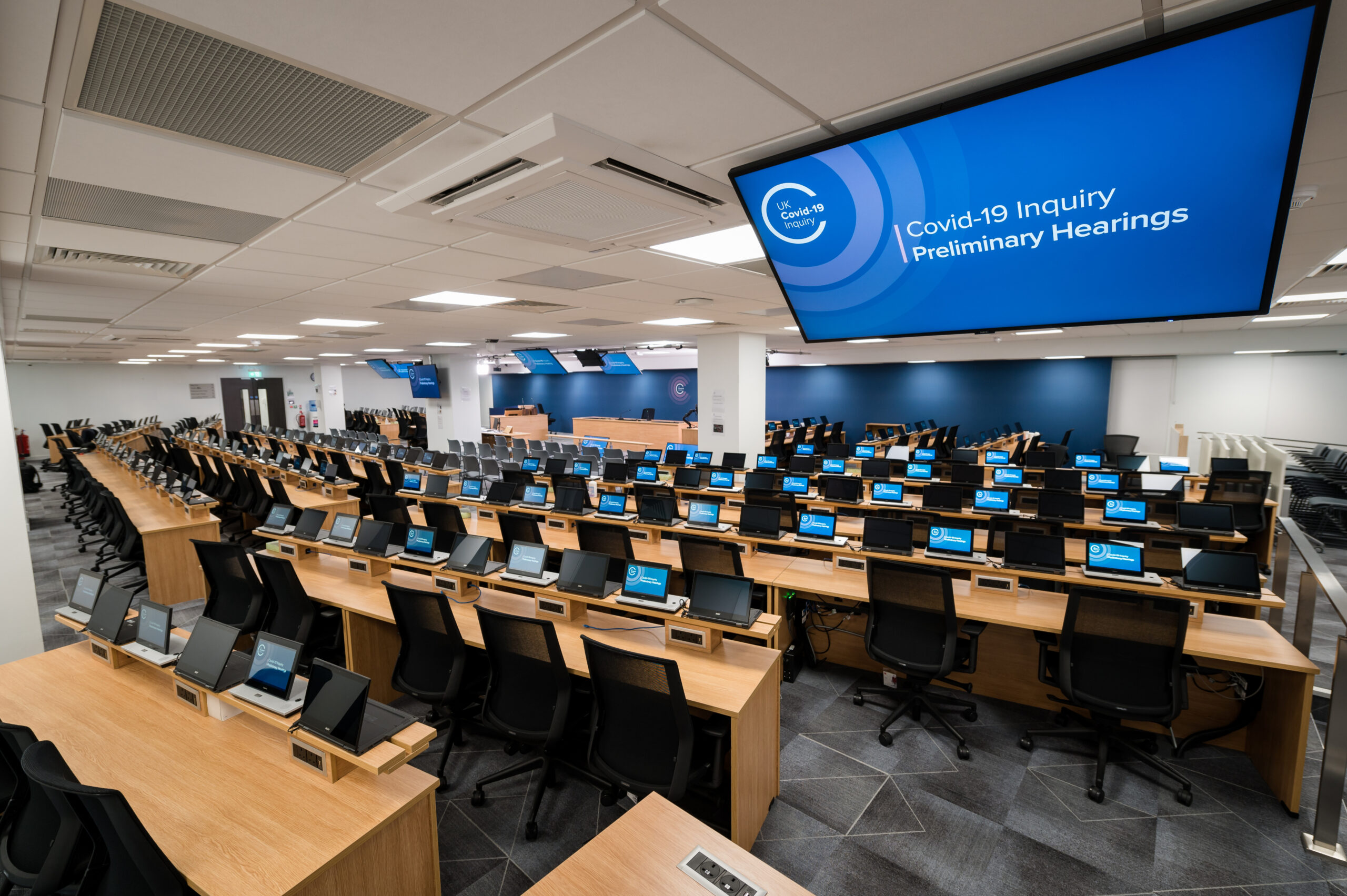What is a public hearing?
Public hearings (or substantive hearings) are when the Inquiry considers evidence, examines the facts and investigates what happened in order to make findings and recommendations.
Inquiries always have an independent chairperson, often a judge or former judge, appointed by a minister. The Chair of the UK Covid-19 Inquiry is Baroness Heather Hallett. During the hearings, the Inquiry calls witnesses to give evidence. Witnesses give evidence on oath and are questioned by a Counsel to the Inquiry. Counsel for Core Participants in the Inquiry can also ask questions with the Chair’s permission.
An Inquiry is an inquisitorial process: the Inquiry is established to examine the facts and to find out exactly what happened. This is different from an adversarial process.
Upcoming hearings
Care Sector
Dates: 30 June – 31 July 2025
Module: 6
Type: Public
Economic response
Dates: 10 September 2025
Module: 9
Type: Preliminary
How hearings are structured
The UK Covid-19 Inquiry is split into different investigations which will examine different parts of the UK’s pandemic response. These are called modules. Each module has a different area of focus. This is to ensure the Inquiry’s investigations have sufficient breadth and depth. There will be public hearings for each module and the first public hearing will be in June.
All Inquiries start by collecting evidence, obtaining statements from witnesses and analysing documents to establish what happened. They then often move on to asking why it happened and what can be done to prevent it from happening again.
At public hearings, the Inquiry will hear evidence from witnesses. These witnesses will be questioned by the Inquiry’s counsel team, which is led by Hugo Keith. As Leading Counsel to the Inquiry, Hugo’s role is to give independent legal advice to the Chair, present the evidence, and lead the rest of the counsel team.
A Core Participant is an individual or group that has a specific interest in the Inquiry’s work. They have a legally defined role within the Inquiry, get advanced access to documents and can suggest lines of questioning for witnesses. They may ask questions of witnesses with the Chair’s permission. Core Participants are designated on a module by module basis, meaning they may vary for each module. You do not need to be a Core Participant to provide evidence to the Inquiry.
The Inquiry Chair, Baroness Hallett is responsible for hearing evidence. She is also responsible for making procedural decisions and making findings and recommendations. The Chair has promised to publish regular reports and recommendations, so that lessons are learned as soon as possible.
Attending hearings in person
Reserving seats for public hearings at Dorland House, London Hearings Centre
Hearings will be open to the public to attend. They will take place at the UK Covid-19 Inquiry Hearing Centre – Dorland House, London, W2 6BU
Our booking forms for the public gallery will go live every Monday at 12pm, one week prior to the hearing week. We encourage you to check back at this time to secure your place.
Please note that availability is limited, and we recommend booking early to secure your seat. The booking links will appear below.
MODULE 6 – Care sector – Seat Reservation Form for the UK Covid-19 public hearing – WEEK 4
Please note that Baroness Hallett will chair the hearings remotely during the third week of Module 6 hearings (w/c 14 July).
Please review the Security checks and prohibited items list below before attending the hearing centre – Dorland House Security Checks and Prohibited Items
Please note that bookings for a seat in the public gallery close at 12pm on the day before a hearing. If a hearing falls on a Monday, bookings will close at 12pm on the Friday before.
If you are unable to find the date you wish to book, please email our team at operations.team@covid19.
For more information on how to get to and use the London hearing centre, please see the below user guide:
London Hearing Centre – Public User Guide
Entrances to Dorland House
Public Entrance
Located at 121 Westbourne Terrace near the junction with Bishops Bridge Road. This entrance is open for public hearings from 9am.
Get directions to 121 Westbourne Terrace (opens in new tab)
Step Free Entrance
A step free entrance is located at 13 Bishops Bridge Road. Wheelchair users and those who require assistance to enter the building should use this entrance.
Watching hearings online
All hearings will be live streamed on our website and our YouTube channel (opens in new tab), subject to a three minute delay. All live streams are available to watch later.
